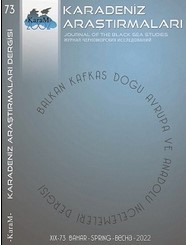TÜRK MİTOLOJİSİNİN KAPRİSLİ VE TUTARSIZ YARATIĞI: “BİÇURA"
THE CAPRICIOUS AND INCONSISTENT CREATURE OF TURKISH MYTHOLOGY: BİÇURA
Author(s): Ahmet Tacetdin HALLAÇSubject(s): Cultural history, Customs / Folklore, Oral history, Turkish Literature
Published by: Karadeniz Araştırmaları Merkezi
Keywords: Biçura; mythology; house spirit; character analysis; iye;
Summary/Abstract: The recognition of a mythological “being” – or, more specifically, a mythological “element” – helps us reveal the historical psychology of a given society, its understanding of being, its philosophy, and the origins of actions in the cause-and-effect relationship. Standing mountains, flowing springs, rain falling on the earth, natural elements, and order of the world all affect a society’s life-death relationship. The same goes for eating habits, hunting, moral rules, and – above all – mythological figures, as well. Since the dawn of time, people have believed that their households and all they contain (stoves, barns, etc.) have embodied "other wordly" beings, and that they cohabitate with them. In the Turkic context, one such an example is Bichura. In this paper, we will examine Bichura’s external (physical traits, action sequence, mythological status) and internal (psychology, sympathy) structures. In both written and oral sources, Bichura can take the form of either black and white spirits (iyes, a mischievous inhabitant of the house it enters). Among the Tatars and Bashkirs, Bichura is moody and capricious. It likes to annoy people. It brings wealth upon any house it lives in, and poverty upon any house it leaves. Whist its mythological position is unclear, it is neither totally feared (like underground black spirits), nor is is it heavenly and good either. Beyond that, we will also attempt to reveal when Bichura first made an appearance in Turkic literature.
Journal: Karadeniz Araştırmaları
- Issue Year: 2022
- Issue No: 73
- Page Range: 183-201
- Page Count: 19
- Language: Turkish

